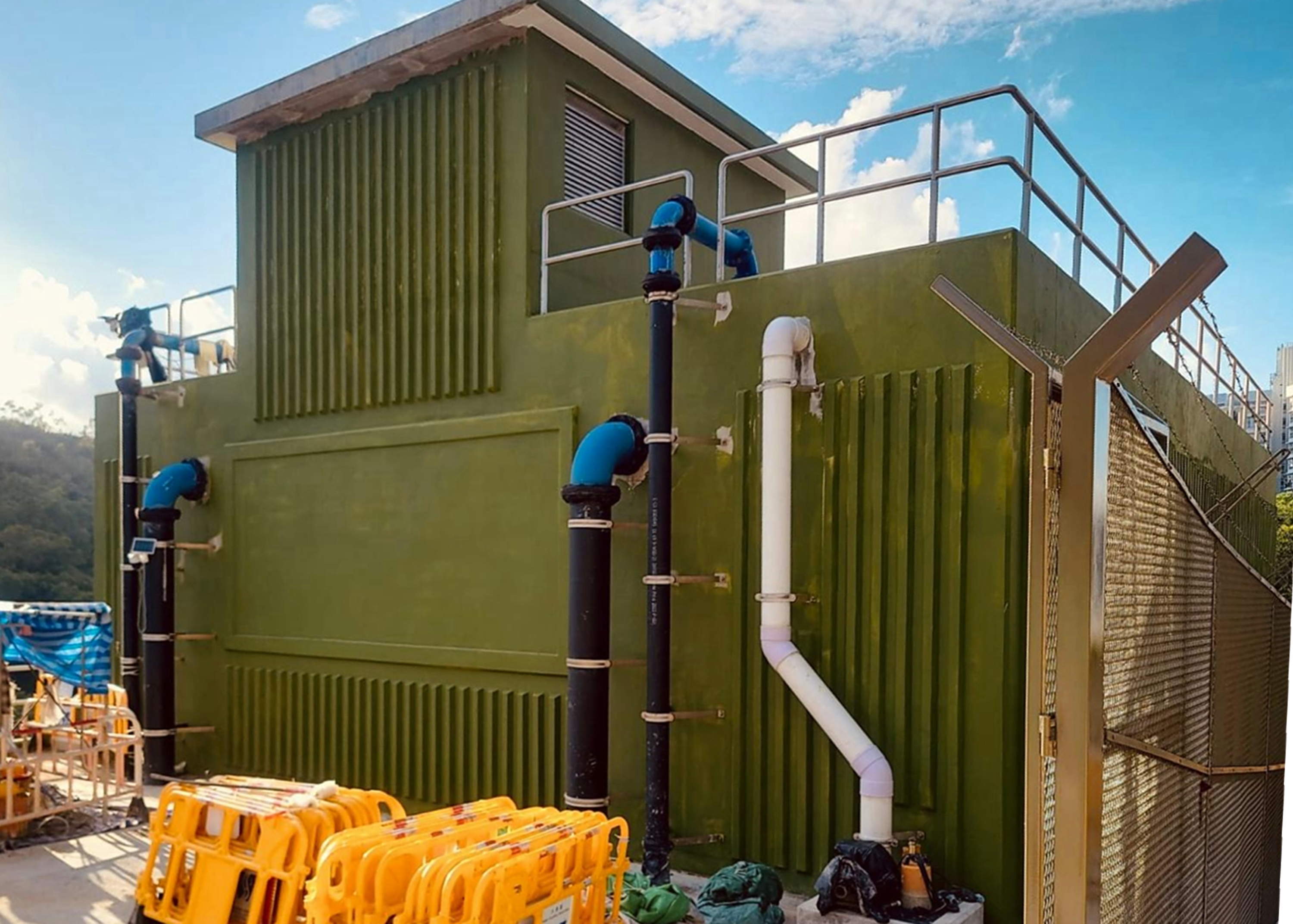
A new saltwater supply system in Hong Kong was delivered six months early using NEC. Completed on budget in February 2024, the HK$90 million (£9 million) scheme provides toilet flushing water to over 11,000 homes in Sha Tin in the New Territories.
The Water Supplies Department (WSD) of the Government of the Hong Kong Special Administrative Region of the People's Republic of China engaged contractor Kin Kay Machinery Rental and Engineering in August 2021 under a NEC3 Engineering and Construction Contract (ECC) Option B (priced contract with bill of quantities). WSD acted as NEC project manager.
 The works involved construction of a 4000 m3/day saltwater pumping station at To Shek, an 820 m3 saltwater service reservoir at Shui Chuen O and 2 km of 100 mm to 300 mm diameter saltwater mains. Mechanical and electrical equipment were procured and are being installed under a separate NEC4 ECC Option A (priced contract with activity schedule) contract. The system will provide toilet flushing water to the 18 tower blocks of the Shui Chuen O public housing estate, helping to relieve the burden on local freshwater supplies.
The works involved construction of a 4000 m3/day saltwater pumping station at To Shek, an 820 m3 saltwater service reservoir at Shui Chuen O and 2 km of 100 mm to 300 mm diameter saltwater mains. Mechanical and electrical equipment were procured and are being installed under a separate NEC4 ECC Option A (priced contract with activity schedule) contract. The system will provide toilet flushing water to the 18 tower blocks of the Shui Chuen O public housing estate, helping to relieve the burden on local freshwater supplies.
Collaborative culture
WSD senior construction engineer Ku Kwok Pun says the NEC requirement to act in a ‘sprit of mutual trust and co-operation’ greatly enhanced collaboration and partnering in the project team. ‘To foster a culture of collaboration and improve communication, the team members shared the same site office. Regular meetings were held to address site problems and identify the best solutions, and regular partnering workshops were held to build up mutual trust and establish common goals among team members.’
He says the plain language used in the contract was also a benefit. ‘Kin Kay is a relatively small local contractor with limited experience in contract management and public works contracts. However, it easily understood the plain English contract terms, despite not having worked with NEC before.’
Ku says the NEC contract clearly defined the responsibilities of each party too. ‘With this and more equitable risk sharing among the contractual parties, the contractor was able to submit a more competitive tender price with less assumed risk. Furthermore, the specified periods for reply – especially for compensation events – ensured both parties responded to communications in a timely manner and secured the cash flow of the contractor.’
He says good use was made of the NEC early warning mechanism, which fostered a collaborative culture to promptly resolve problems via joint efforts. ‘For example, the project manager issued an early warning immediately on seeing that actual traffic flows were higher than that anticipated at the design stage, which might have resulted in unfavourable traffic congestion arising from closing a carriageway for construction works.’
Ku says the project manager proactively worked with the contractor and consulted other stakeholders, including the Housing Department and local residents, to revise the saltwater mains alignment at the footpath and develop temporary traffic measures. ‘The footpath was re-opened before the Chinese New Year holidays, traffic disruption was minimised and the construction period was shortened, resulting in a “win-win” for the project team and the public.’
Encouraging innovation
He says adopting building information modelling (BIM) technology helped to reinforce NEC-inspired collaboration. ‘The project manager and contractor could jointly review the BIM model to resolve inter-disciplinary spatial conflicts, and the BIM common data environment served as an efficient shared platform to exchange information, such as submissions and as-built records.’
Ku says the project manager also encouraged the contractor to explore innovative solutions for construction. ‘Examples included electronic wristbands for health monitoring of workers, design for manufacture and assembly (DfMA) of the combined inlets and chambers, and alternative self-compacting backfill material to speed up construction.’
He concludes, ‘As a result of exemplary collaboration and innovative solutions, the scheme was successfully completed on budget and six months ahead of the originally scheduled completion date of August 2024.’
Benefits of using NEC
- NEC requirement to work in a ‘spirit of mutual trust and co-operation’ enhanced collaboration and partnering in the project team.
- NEC-inspired collaboration and the early warning process led to a realignment of the saltwater mains, which reduced disruption to the public and helped the project to finish six months earlier.
- NEC clarity on responsibilities and a more equitable approach to risk sharing enabled the contractor to submit a more competitive tender price.
- Prompt resolution of NEC compensation events helped to secure the cashflow of the relatively small local contractor.




